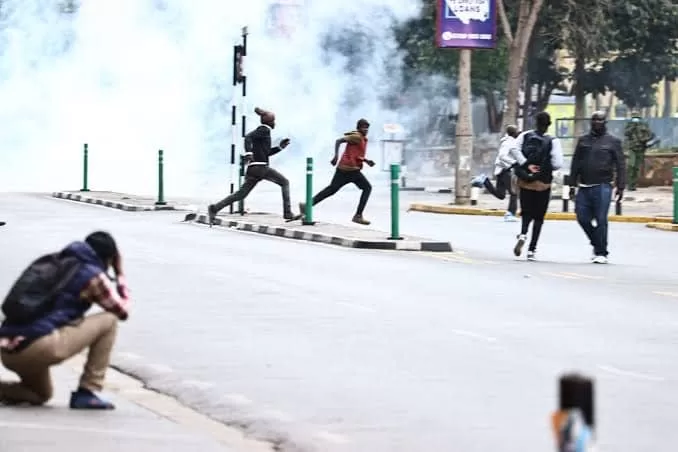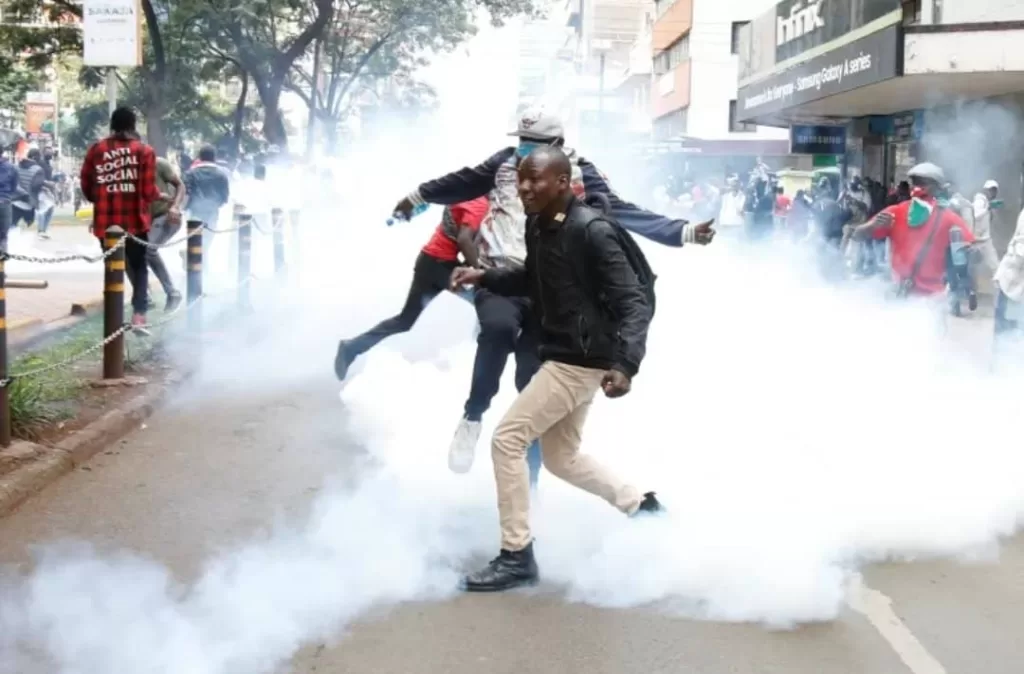Tear gas and water cannons were used by riot police in Kenya on Thursday to scatter thousands of anti-tax protestors in Nairobi. The protestors were staging coordinated marches throughout Kenya over the government’s proposal to levy an additional $2.7 billion in taxes.
Officers used tear gas late in the protest on Thursday to scatter demonstrators who were marching close to the State House, President William Ruto’s official residence, and office.
Prior to this, police had blocked the path to parliament by dousing demonstrators in purple water from water cannons in an attempt to disperse them from Nairobi’s central business district. The protest had seemed to be nonviolent.
On X, the Kenya Red Cross reported that it had treated 39 protest-related injuries, eight of which were critical.

Requests for comments were not answered by Nairobi police commander Adamson Bungei or police spokesman Resila Onyango.
In a statement, Inspector General of Police Japhet Koome declared that no one would be permitted to obstruct legislative sessions or seize vital government buildings.
Anti-tax Protesters claim that the tax increases, which are intended to lower the budget deficit, will harm the country’s economy and drive-up living expenses for Kenyans, many of whom are already struggling to make ends meet.
“We are fighting for our future even though we are not paying taxes at the moment. Theru Nderitu, a student who participated in the demonstration, told in an interview that “we need young people to fight for our future rights.”
As a result of popular criticism over its proposed tax measures, the administration has given up some ground.
High tax rates on daily necessities
On Tuesday (18th June, 2024), a parliamentary commission made the recommendation that the government remove several new taxes that were included in the finance bill. These taxes included ones on financial transactions, bread, cooking oil, cars, and bread ownership.
The panel suggested raising the fuel tax to fund road upkeep as well. On a campaign of aiding Kenya’s working poor, President Ruto was elected nearly two years ago, yet he has repeatedly encountered anti-tax demonstrations. He has defended the tax hikes, arguing that less borrowing is necessary for the government.
He supported the suggestions made by the parliament group to drop some of the government’s tax plans.
“Ruto Must Go” chants
Demonstrators yelled “Ruto must go” and brandished placards with slogans like “We say no to economic dictatorship” as they urged MPs to drop the measure in several towns on Thursday, including Nyeri, Nakuru, Eldoret, Isiolo, Mombasa, and Kisumu. The demonstrations were nonviolent. Police also dispersed protestors in Eldoret on Thursday (20th June, 2024) afternoon.

In order to lower state borrowing, the government has been advised by the International Monetary Fund to raise revenues in its 2024–2025 budget.
On Thursday, during the bill’s second reading in parliament, lawmakers were discussing it. Ruto holds a majority in parliament, despite the fact that a few members of his coalition have voiced concerns about the plan.
The majority leader of the parliament, Kimani Ichung’wah, announced that members would convene on Tuesday to cast votes on the bill’s suggested amendments.
The Finance Ministry informed parliament that eliminating the few proposed tax increases would result in a 200 billion Kenyan shillings ($1.56 billion) revenue shortfall in the 2024–2025 budget, necessitating corresponding spending cuts, according to Ndindi Nyoro, the head of the parliament’s budget committee.